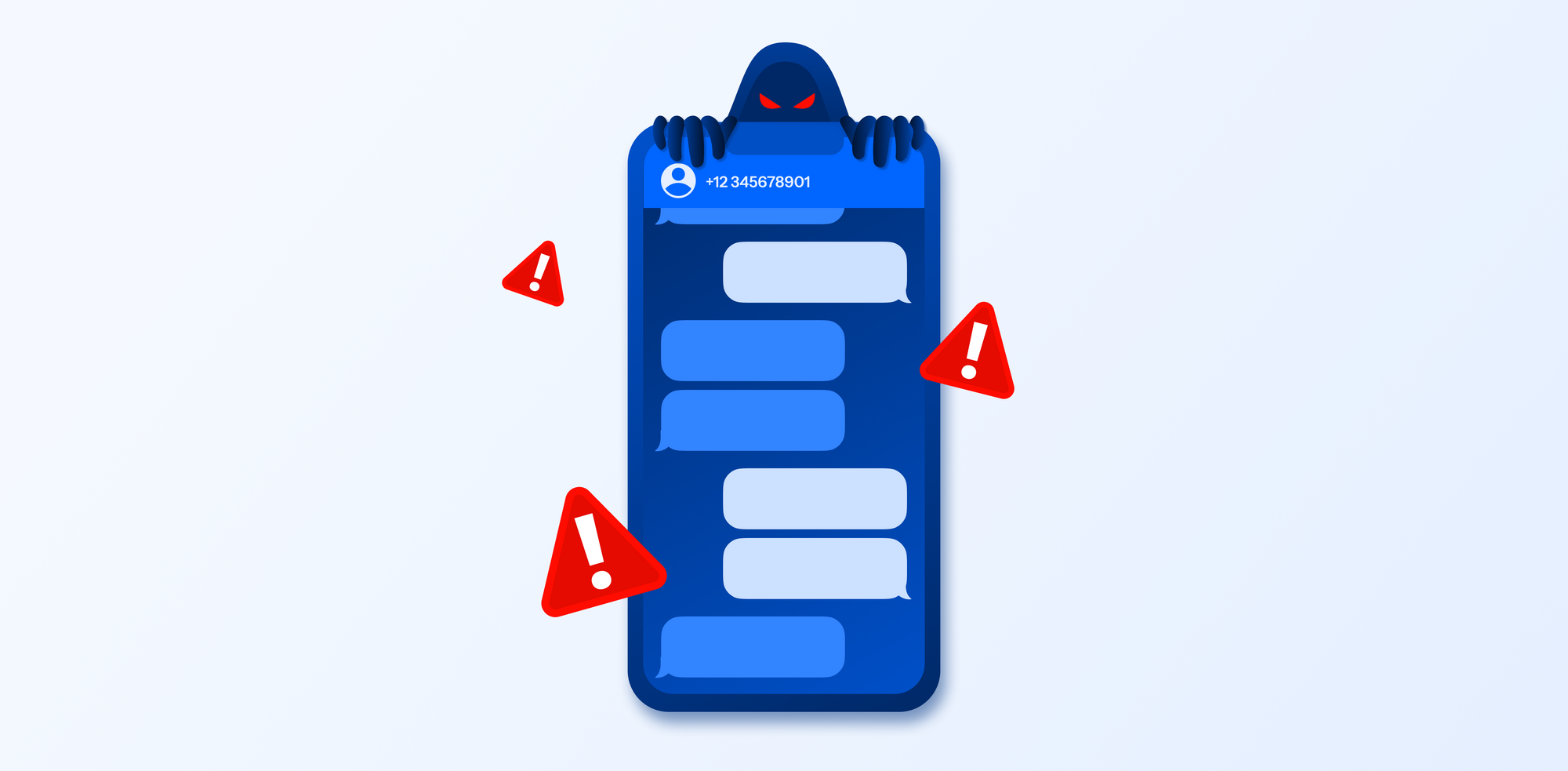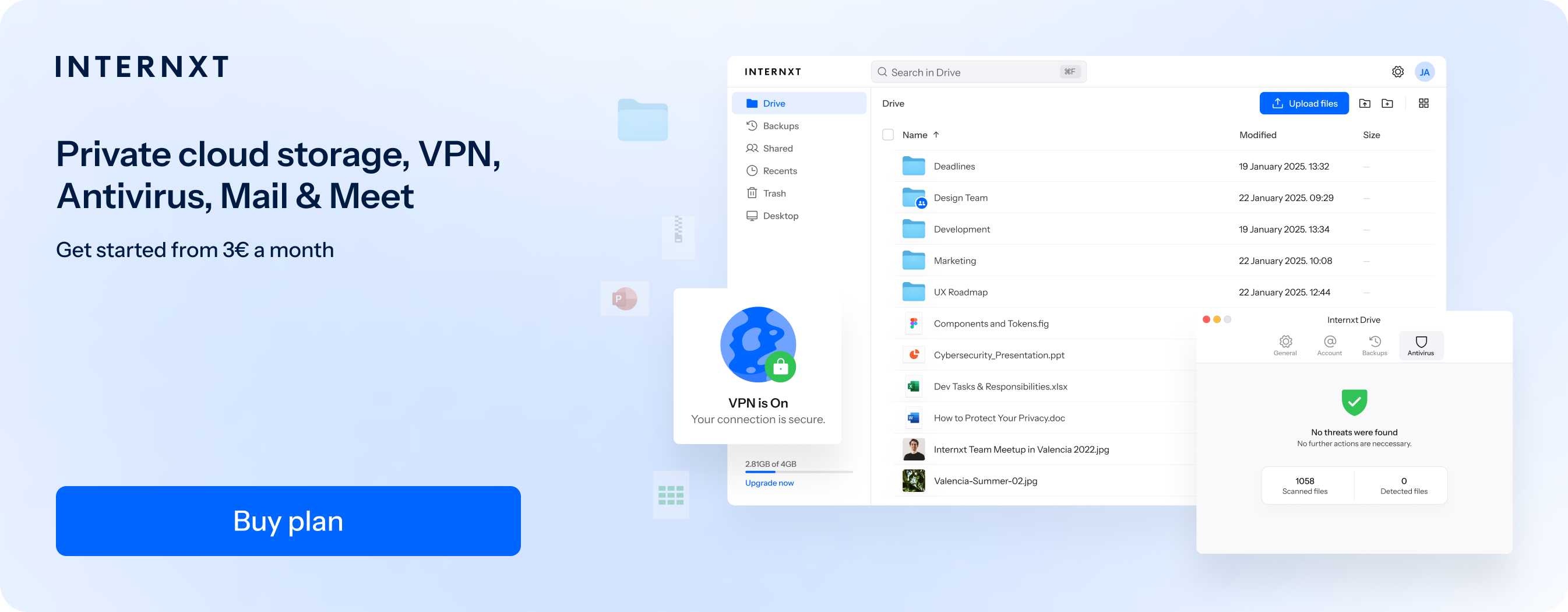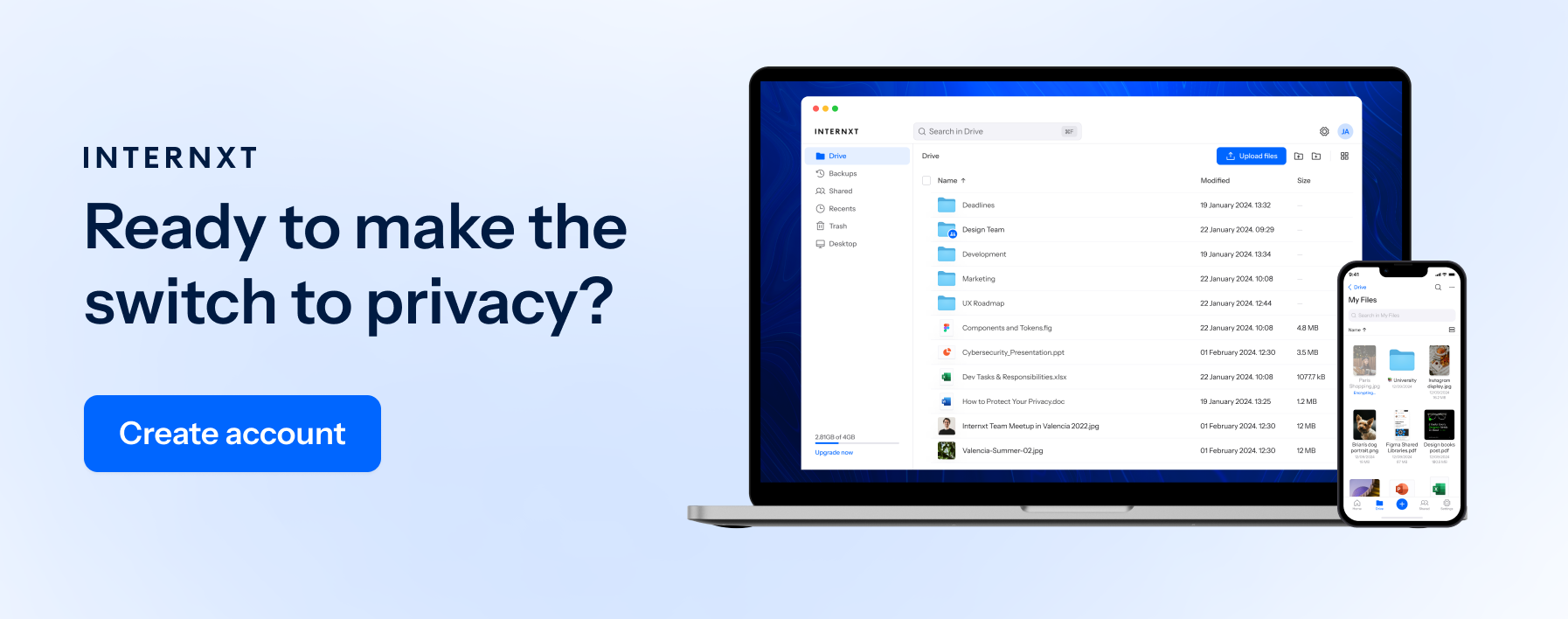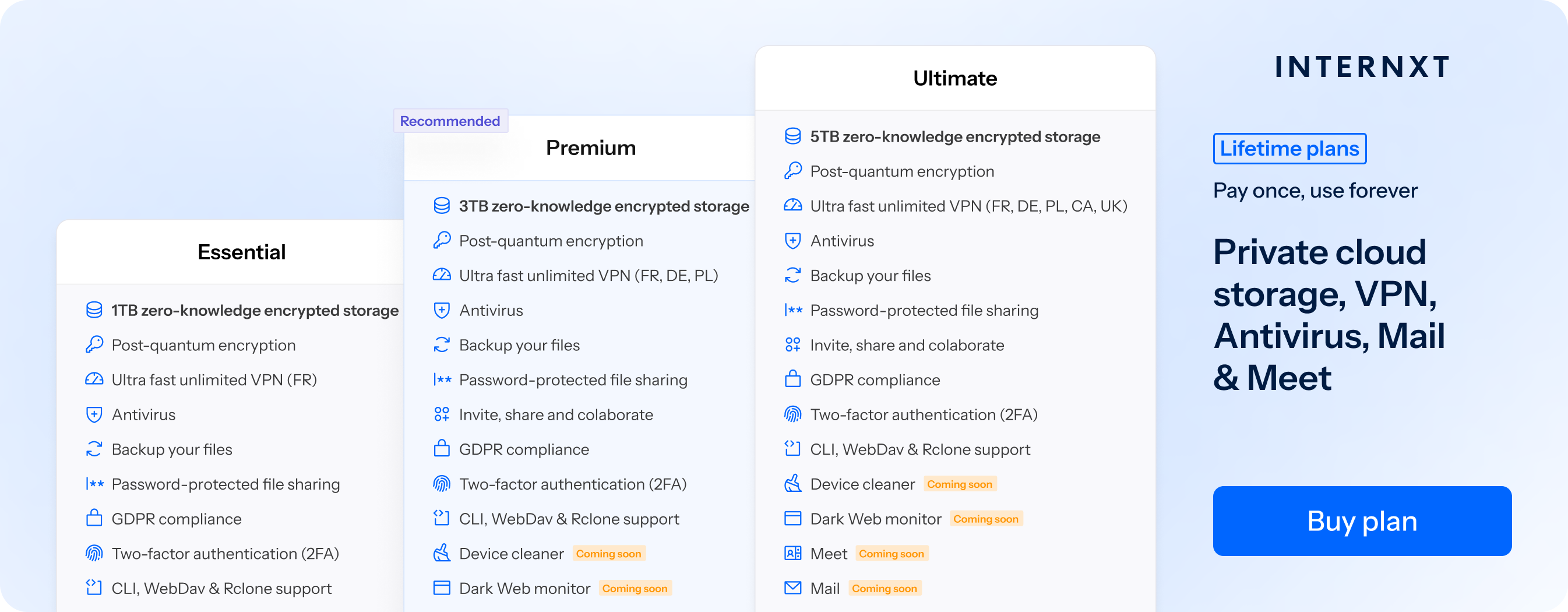14 WhatsApp Scams & How to Avoid Them

WhatsApp has reached over 2 billion users worldwide, making it one of the most popular messaging platforms available for your phone, tablet, and desktop. It’s a great way to connect with friends, send photos, create group chats, and host video calls.
It also gives scammers a huge field to play with when attempting to scam people online. To help you protect your data, finances, and accounts, we will explain the 14 most common WhatsApp scams cybercriminals use and how to prevent them.
With the knowledge and techniques presented in this article, you will be able to protect yourself from the common scams making their way online. For even more protection and security, you can sign up to Internxt free account, and gain the best privacy online with our cloud storage, plus VPN, Mail, and Meet products, too!
Here’s the list of the common scams to be aware of if you’re one of the 2 billion people using WhatsApp.
Table of contents
- Friends and family scam
- Tech support
- Fake job offers
- Real estate scams
- Giveaway scams
- App authentication requests
- Upgrade to WhatsApp Gold
- Fake WhatsApp downloads
- Fake gift cards or surveys
- Call forwarding WhatsApp scams
- QR code scams
- Fake investments
- Dating scams
- Phishing
14 WhatsApp scams you need to know
Friends and family scam
First in our extensive list of WhatsApp scams is scammers posing as a close friend or family member, similar to the methods used in pretexting scams.
The message will use a fake profile of someone close to you, pretending to be in an emergency, and they need your help and money to get out of it, usually via PayPal, or crypto.
How to prevent it:
- Ask questions only a real friend or family member would know.
- Check for unusual language or urgency from the person requesting money.
- Check with other family members or friends to verify the situation.
Tech support
Tech support scammers will post as a technician from a tech company and will pose as an employee from WhatsApp or other well-known companies
The representatives will contact you via WhatsApp, informing you of a security breach, a problem with your login details, an error with updating the software, or suspicious account activity.
The purpose of this scam is to gain access to your account by convincing you to give your login credentials or verification codes. If they receive this information, they can lock you out of your account or use it to impersonate you and send phishing messages to your contacts.

How to prevent it:
- Know that any tech support team will never contact you unless you contact them first.
- Companies will never ask for your login details via messages or emails.
- Unexpected messages asking for login details or verification are highly likely to be a WhatsApp scam.
Fake job offers
One of the most common WhatsApp scams, fake job recruiters who will send messages, again, out of nowhere, offering you a job offer with numerous benefits, high salaries, flexible remote hours, and other competitive benefits.
In reality, they are looking to steal your finances by asking you to pay for mandatory training, onboarding, training, or other resources, or try and steal your social security number or other sensitive information.
A fake job offer scam message may look something like this:
How to prevent it:
- Be highly skeptical of job offers from external sources. Recruiters will use platforms such as LinkedIn or Indeed to post jobs.
- Real employers never ask you to pay for materials or onboarding.
- Check the company online, reviews, online presence, etc. If there is none, it’s likely a scam.
- Only provide your information once a formal offer and contract are made, and through secure channels.
Real estate scams
A real estate scam is another one of these WhatsApp scams hoping to lure people in with incredible offers in the form of real estate listings.
The listing includes incredible apartments or houses, with low amenity costs, rent, and a lax screening process. Communication will happen via WhatsApp, and the scammer will ask for an upfront deposit via crypto, wire transfer, or P2P apps.
They may also ask for sensitive documents, such as passports or SSN, or bank details, if their purpose is identity theft.
How to prevent it:
- If you see a listing you suspect is a scam, report it so it’s taken down as soon as possible.
- Be suspicious of unsolicited messages offering you a rental or a house for sale.
- Verify the real estate company and agent; don’t send a deposit without viewing the property first.
- Only make payments via secure, verified channels.
Giveaway scams
A giveaway is one of the most popular social media scams that claims you have won a large amount of money, either from a lottery or another kind of giveaway from a company.

However, in return for the “winnings,” the scammer will ask for a small processing fee to release the money, or your bank details to confirm the transfer. To create a sense of urgency, the scammer will claim they need this money immediately, or the offer will expire.
How to prevent it:
- Verify the company and offer by contacting them directly.
- If you didn’t enter any lottery or giveaway, it’s likely a scam.
- Don’t follow links from WhatsApp messages, social media, or email, as they are likely phishing.
App authentication requests
Two factor and multi-factor authentication are valuable and necessary tools to have to protect your accounts from hackers and scammers. Even so, it doesn’t stop cybercriminals from trying to find a workaround to this added security.
The scammer will contact you, claiming they entered the wrong number to access their account. They’ll then ask you to give them the code sent to your number so they can log in; instead, this gives them access to your account.
These kinds of WhatsApp scams may look something like this:
How to prevent it:
- Don’t share any authentication code with anyone.
- If you receive an unexpected verification method, treat it as a hacking attempt on your account, so check your accounts and change your passwords to be safe.
Upgrade to WhatsApp Gold
There’s no such thing as WhatsApp Gold, even so, it’s still one of the most common WhatsApp scams to look out for. In this scam, scammers will send a link to a spoofed website, offering you a more exclusive and premium version of the popular messaging app.
In reality, the link will direct you to a fake website that will steal your personal information or infect your device with malware.
To prevent this scam:
- Ignore any messages about WhatsApp gold, it doesn’t exist, so it's always a scam.
- Only download apps from your app store and verify their authenticity before.
- Never click on links from unsolicited contacts.
Fake WhatsApp downloads
Similar to the WhatsApp Gold scam, scammers will spread a link through various channels to try and trick people into downloading a malicious version of the official WhatsApp application. Once downloaded, it will install malware on your phone and/or steal your sensitive information.
These fake apps may look like something like this:
To avoid these fake WhatsApp app scams:
- Never download apps from unofficial app stores, websites, or unsolicited links.
- Check and verify that the publisher is WhatsApp LLC before installing.
- Only download from the Apple or Google Play Store.
Fake gift cards or surveys
Fake rewards, such as gift cards, are spread by scammers offering gift cards in exchange for completing a short survey.

They pose as well-known brands such as Apple, Google, Spotify, etc, to lure you into clickíng a link with a survey designed to steal your personal information, download malware, or unknowingly subscribe to paid services.
The reward never arrives, and your data is left vulnerable to identity theft or sold to third parties who will target you with even more scams.
To prevent these scams:
- Don’t click on links from social media or other websites offering free rewards in exchange for your data.
- Delete or report messages as junk, offering you winnings from contests you never entered.
Call forwarding WhatsApp scams
A scammer will contact you claiming to represent a trusted institution, like your bank, instructing you to dial a specific number on your phone, which then activates call forwarding. The number may look something like this:
**67* < 10-digit number> forwards all your calls to the 10-digit number.
*405* < 10-digit number> forwards calls, if your number is busy, to the 10-digit number.
Once activated, all calls meant for you will be redirected to the scammer, allowing them to access verification codes of your accounts, apps, email, banks, etc.
How to prevent it:
- Check your call forwarding settings regularly and disable unknown forwards.
- Never dial codes or numbers sent by unknown people.
- Enable two-step verification in WhatsApp for extra security.
- Report suspicious activity to your mobile provider and WhatsApp.
QR code scams
QR codes are also highly utilized in scam attempts and are used in WhatsApp scams to hijack your WhatsApp account. The scammer will pretend to be a friend, coworker, or business, sending you a QR code claiming it's for account verification, work needs, or other purposes.
Once scanned, the QR code links to your WhatsApp login session, allowing the hacker to hijack the account.
How to prevent it:
- Enable two-step verification on WhatsApp for added protection.
- Never scan QR codes sent by unknown or untrusted sources.
- Be cautious of anyone making unsolicited requests asking you to scan a QR code for verification.

Fake investments
Fake investments in stocks or bonds are also common WhatsApp scams that regularly target people. They create a sense of urgency and fear of missing out by presenting the investment as a once-in-a-lifetime and high-reward opportunity that can’t be missed.
How to prevent it:
- Only invest money in trusted and verified platforms regulated by the finance industry.
- Verify the WhatsApp investment advisor credentials and registrations with a broker check tool or a reputable regulatory body.
- Don’t click on links or attachments offering guaranteed investment returns from unknown sources.
Dating scams
Romance scams circulate on social media and dating apps to start the conversation before moving it to WhatsApp. This prevents them from being restricted by the app's security policies, such as fake profile reporting and message moderation.
Once the conversation shifts to WhatsApp, the scammer will take time to build a relationship and trust, and start their scam, typically asking for money to cover an emergency or to cover the travel costs needed to meet up.
How to prevent it:
- Do a reverse image search of the profile photos to verify the ID online.
- Ask for a video call or meet up in a safe place to verify the person’s identity, and be skeptical of vague excuses.
- Don’t send money, gifts, or personal information to people you meet online, especially if they are trying to emotionally blackmail you.
Phishing
Scammers may also send out general phishing messages to hundreds of thousands of numbers, which may have been breached online, in an attempt to be successful. These kinds of phishing messages may be more generic or use AI scam techniques to try and trick people into clicking on a malicious link or download.
How to prevent it:
- Check for urgent and demanding language asksing you to take immediate action.
- Look out for grammar or spelling errors.
- Report suspicious messages to WhatsApp, then block the number.
- If you have any doubts, it’s best to not click on any links you may receive.
Protecting yourself against WhatsApp scams
By following the steps provided in this article, you can now spot and prevent WhatsApp scams more easily. If you haven’t already, you should also turn on two-step verification on your WhatsApp account for more security. Here’s how:
- Open WhatsApp settings
- Tap Account > Two-step verification > Enable
- Enter a 6 digit PIN and confirm.
- Provide an email address in case you ever need to reset the PIN.
- Tap next. Confirm email.
- Tap save or done.
If you suspect a message is an AI scam, you can check it using our AI detector to see if you’ve received an AI-generated message from a scammer, and you can delete and report the message from there.

You can also use our free Dark Web Monitor tool to check if your email, phone number, or any other sensitive information has been leaked online, and our strong password generator to give you the best password protection for all your accounts.
Stay up to date with Internxt for the latest news in tech and cybersecurity, or buy any of our paid plans to access our secure suite of products: Drive, VPN, Meet, Mail, and more, for the ultimate privacy and security online, starting from just €3/month.

